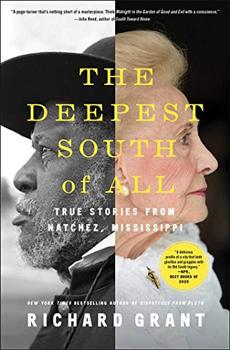Summary | Excerpt | Reviews | Beyond the Book | Readalikes | Genres & Themes | Author Bio

True Stories from Natchez, Mississippi
by Richard Grant
We parked outside a mansion of staggering enormity and opulence. Stanton Hall occupies an entire city block in the middle of Natchez, and it's one of the grandest homes in the South to survive the Civil War. Its monumental size and massive Corinthian columns are softened and feminized by lacy ironwork on the balconies, and gorgeous trees and flower gardens in its grounds. It's one of the jewels in the crown of the Pilgrimage Garden Club, which operates it as a house museum for tourists, and a social venue for balls and parties such as this one.
We climbed up the white stone steps and entered the main hallway, which is more than seventy feet long. All the furniture, draperies, and paintings were antebellum antiques, which gave the impression that the clock had stopped on the eve of the Civil War. This impression was deepened by the fact that all the guests were white, and all the serving staff were African Americans in black-and-white uniforms.
"You can't win with that one," said Doug. "If you hire white people, you're discriminating against black people by denying them employment. If you hire black people, you're perpetuating the racial dynamics of slavery in an antebellum setting. So we do what we want, and most of the time we hire black people. They're friends of our friends, they need the work, and they do a good job. If you've got a problem with that, I can't help you."
It occurred to me that hiring black and white staff might be an option, but I didn't press the point. Regina and Doug went off to circulate, and I wandered through the vast mansion to the back gallery, where the bar was set up. I asked the bartender for a glass of red wine. He gave me a look that I couldn't interpret—was it something to do with my accent, or my attire? Then he said, "How about white wine?"
Standing behind me was a large bearish man with bright blue eyes and a slightly sad, soulful look. "It's the rugs," he explained. "The antique rugs in the dining room are a pale creamy color. They never serve red wine at Stanton Hall so the garden club ladies don't have to murder anyone for spilling it."
I ordered a Scotch on the rocks. I had the persistent feeling that I'd walked into a movie set, that none of this was real. I was transfixed by the older women. They were in their eighties and nineties, glittering with diamonds, hair swept up into chignons and bouffants. They carried themselves with regal grace and dignity and in moments of repose they looked like waxworks.
I watched carefully as they seated themselves on antique chairs along one wall of the dining room. These were the grandes dames of the Pilgrimage Garden Club, true power brokers in Natchez high society, and younger women lined up to pay court to them. Since the grandes dames were seated, the younger women were forced to crouch down awkwardly, or kneel in an attitude of complete supplication, to avoid talking down to their social superiors. The older women sometimes clasped a hand to help them balance.
One poor woman, crouching in front of a high-ranking octogenarian, accidentally knocked a glass of Coca-Cola onto the pale antique rug. The old dowager stiffened. Then she cut the offender dead with a slight adjustment of her eye muscles, the beginnings of a fake smile halted too soon, and an almost imperceptible turn of her jaw to the side, as the woman wailed her apologies and tried desperately to blot up the stain with a table napkin. It seemed entirely possible that she might be removed from the party and garroted under the live oaks.
I made the acquaintance of Bettye Jenkins, who was ninety and looking fabulous in a black pantsuit with gold shoes and her white hair in a perfect chignon. I told her it was my first time in Natchez, and I had been hearing about Pilgrimage. Could she explain it?
"Why, yes, that's when we put on our hoopskirts and receive," she said in a refined Southern drawl.
"Receive?"
Excerpted from The Deepest South of All by Richard Grant. Copyright © 2020 by Richard Grant. Excerpted by permission of Simon & Schuster. All rights reserved. No part of this excerpt may be reproduced or reprinted without permission in writing from the publisher.
Your guide toexceptional books
BookBrowse seeks out and recommends the best in contemporary fiction and nonfiction—books that not only engage and entertain but also deepen our understanding of ourselves and the world around us.